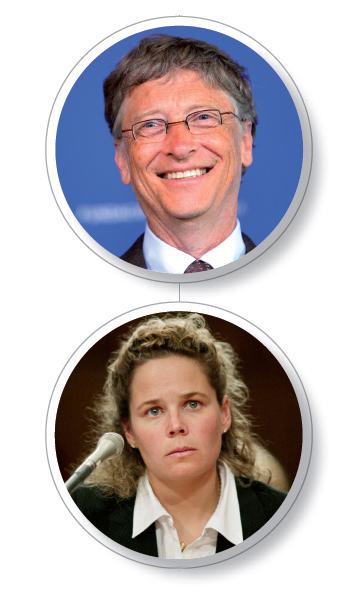Exploring American Histories: Printed Page 927
Exploring American Histories, Value Edition: Printed Page 755
American Histories: Bill Gates and Kristen Breitweiser
AMERICAN HISTORIES

William Henry Gates III started tinkering with computers at age thirteen. At that time in the late 1960s, computers were big, bulky machines that filled entire rooms. As a teenager in 1969, the enterprising Gates and some of his friends set up a business to make computerized traffic counters to gauge the speed of automobiles and other vehicles, for which they earned $20,000.
His brilliant mathematical mind and entrepreneurial inclinations led Gates to enroll at Harvard, where those same qualities soon led him to drop out. He spent more time at the university’s computer center than he did in class, and in 1974 he became interested in microcomputers as an alternative to large conventional computers. A year later, Gates went to Albuquerque, New Mexico, and formed a computer software company called Microsoft (an amalgam of microcomputer and software). He envisioned the microcomputer on every office desktop and in homes throughout America. Gates actively pursued the lucrative financial rewards that microcomputers would bring, in contrast to other microcomputer pioneers who did not seek commercial gain and shared information and software with one another freely and unconditionally.
Bill Gates succeeded beyond all expectations. In 1980 Microsoft, now headquartered in Redmond, Washington, collaborated with International Business Machines (IBM) to create a software package for IBM’s new line of personal computers. Additional technological breakthroughs came rapidly. Microsoft joined the financial boom of the 1980s and in 1986 became a publicly traded company on the New York Stock Exchange. Within a decade, Gates became the richest man in America, and like other industrial titans a century earlier, he has donated generously to fund philanthropic activities worldwide.
Despite the enormous benefits of computer technology, the digital revolution has had unforeseen consequences. The terrorists who attacked the World Trade Center and the Pentagon on September 11, 2001, communicated through e-mail and cell phones and trained on computerized flight simulators. They belonged to al-Qaeda, an international terror network that spread its ideology and raised and transferred money over the Internet.
Kristen Breitweiser was a young housewife and mother living in suburban New Jersey on September 11, 2001 (9/11). Her husband, Ron, a senior vice president at an investment management service, worked in Tower Two of the World Trade Center. When one of the planes commandeered by terrorists crashed into the building, her husband died in the fiery collapse of the building, leaving her a widow with a two-year-old daughter. Breitweiser’s loss transformed her from a grieving victim and a stay-at-home mother into a political activist.
She started attending meetings of the Victim Compensation Fund established by the federal government following 9/11. She met Mindy Kleinberg, Lorie Van Auken, and Patty Casazza, widows like herself living in New Jersey. The “Jersey Girls,” as they became known, addressed concerns over victims’ compensation but soon confronted larger political issues. Seeking more than financial compensation for their losses, they demanded to know how the 9/11 attacks could have happened and what the federal government might have done to prevent them. Breitweiser and her colleagues favored an investigation by an independent commission to gather information about what had occurred and to make recommendations to prevent other attacks. However, they found themselves in opposition to President George W. Bush, who initially resisted the creation of such a commission.
Undeterred, the four women mounted a vigorous campaign to pressure the White House and Congress to form a national commission. Breitweiser testified before the Joint Congressional Intelligence Committee to garner support. The women’s perseverance paid off: In November 2002, Congress established a bipartisan commission that President Bush signed into law.
However, the commission’s final report in 2004 disappointed Breitweiser. She called the report “hollow” and criticized President Bush for not fully and openly cooperating with the investigation. Although Breitweiser had voted for Bush in the 2000 election and considered herself a conservative, her rapid political education since 9/11 turned her against his candidacy in 2004. She also spoke out against the Iraq War, which the administration had initiated in 2003 in response to the 9/11 attacks. Breitweiser continued her political activism as a blog writer for The Huffington Post. In this way, this housewife from New Jersey shared her views with millions of people through technology that Bill Gates’s generation had developed. •
THE AMERICAN HISTORIES of Bill Gates and Kristen Breitweiser were deeply affected by the twin forces of digital technology and terror that dominated life in the United States and throughout the world at the start of the twenty-first century. Computers, the Internet, and cell phone technology reformulated commerce and social relations, fostering the globalization that emerged after the Cold War. Google, the Web, Facebook, and Twitter became household words and broke down domestic and global barriers that twentieth-century technology had not yet demolished. Computer technology revolutionized political communication and organization, mobilized ordinary citizens into action, and expanded opportunities for disgruntled and oppressed citizens of foreign countries to overthrow despotic rulers. Driven by new computer models for trading in financial securities, the stock market grew highly volatile, and downturns in the economy became greater in intensity and scope. At the same time, the threat of terrorism continued to preoccupy the United States and its allies around the world, and their governments used the latest technologies to monitor suspected terrorists. Ordinary people paid for this increased surveillance each time they boarded an airplane and were subjected to intimate security searches.